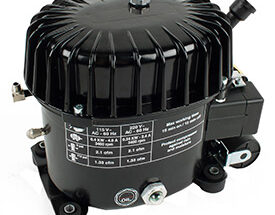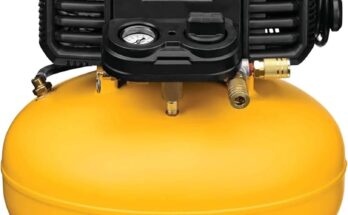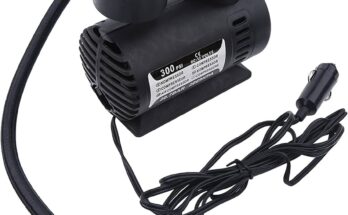When people think of industrial air compressors, they often imagine loud, clunky machines that are difficult to maintain and expensive to run. But that couldn’t be further from the truth. Modern industrial air compressors are incredibly efficient, versatile, and essential for many businesses. Let’s dive into the seven powerful benefits of using an industrial air compressor and see how it can boost your operations.
1. Enhanced Efficiency
One of the biggest perks of using an industrials air compressors is the significant boost in efficiency it offers. These machines are designed to power a wide range of tools and equipment, which can drastically reduce the time and effort needed to complete tasks. For instance, in manufacturing, compressed air can automate processes that would otherwise be manual and time-consuming.
2. Cost-Effective Operations
Believe it or not, investing in an industrials air compressor can save you money in the long run. These compressors are built to last and can handle heavy-duty use, which means fewer breakdowns and lower maintenance costs. Plus, with energy-efficient models available, you can cut down on your energy bills. Keywords like “industrials air compressor cost” and “energy savings” come into play here, highlighting the financial benefits.
3. Versatility Across Applications
Industrials air compressors are incredibly versatile and can be used in a variety of applications. From powering pneumatic tools in an auto repair shop to operating large-scale machinery in factories, these compressors are up for the task. This versatility makes them a valuable asset in any industrial setting.
4. Improved Safety
Safety is a top priority in any industrial environment, and using an industrials air compressor can enhance workplace safety. By powering tools and equipment with compressed air instead of electricity, you reduce the risk of electrical hazards. Additionally, modern compressors come with built-in safety features to prevent accidents.
5. Easy Maintenance
Maintaining an industrials air compressor is simpler than you might think. Regular maintenance involves basic tasks like changing filters, checking oil levels, and inspecting hoses. With proper upkeep, these machines can run smoothly for years, minimizing downtime and ensuring consistent performance.
6. High Reliability and Durability
Industrials air compressors are built tough to withstand harsh conditions and heavy use. This durability ensures that your compressor will provide reliable performance over its lifespan. Investing in a high-quality compressor means fewer replacements and repairs, saving you money and hassle.
7. Environmental Benefits
Using an industrials air compressor can also be good for the environment. Many compressors are designed with energy efficiency in mind, reducing your carbon footprint. Additionally, because they can power tools and machinery more efficiently, they can help reduce overall energy consumption in your operations.
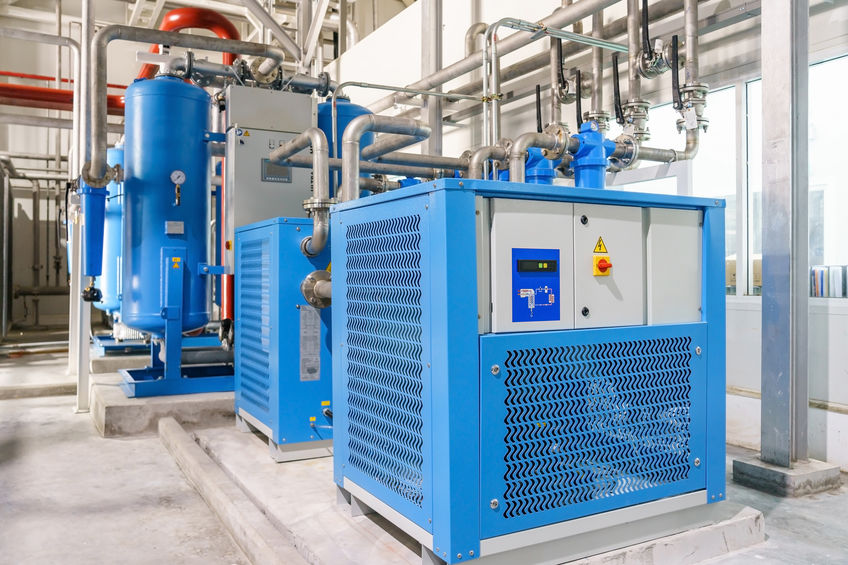
Photo By: jhfoster.com
Why Choose an Industrial Air Compressor?
Choosing an industrial air compressor is a smart move for any business looking to improve efficiency, reduce costs, and enhance safety. Whether you need a portable industrial air compressor for on-the-go jobs or a high-capacity model for large-scale operations, there’s a compressor out there to meet your needs.
Industrial Air Compressors Are Not Just for Factories
A common misconception about industrial air compressors is that they are only useful in large factories or heavy industries. However, this couldn’t be further from the truth. These versatile machines can be found in a variety of settings, from small workshops to large-scale manufacturing plants, offering immense value and efficiency. Let’s delve into the specifics of industrial air compressors and explore their various applications and types.
Types and Applications of Industrial Air Compressors
Industrial air compressors come in different types, each suited for specific applications. Understanding these types and their uses can help you choose the right compressor for your needs.
1. Reciprocating Air Compressors
Reciprocating air compressors, also known as piston compressors, are one of the most common types. They work by using a piston driven by a crankshaft to deliver air at high pressure. These compressors are ideal for small to medium-sized operations and are often used in automotive repair shops, small manufacturing units, and construction sites.
2. Rotary Screw Air Compressors
Rotary screw air compressors are known for their efficiency and continuous operation capabilities. They use two interlocking screws to compress air, making them suitable for larger industrial applications where a constant flow of compressed air is needed. You’ll find these compressors in factories, food processing plants, and other large-scale operations.
3. Centrifugal Air Compressors
Centrifugal air compressors use a rotating impeller to generate high-pressure air. These compressors are typically used in applications requiring very high volumes of compressed air, such as in petrochemical plants and large manufacturing facilities. Their ability to handle heavy-duty tasks makes them a reliable choice for many industries.
4. Portable Industrial Air Compressors
Portable industrial air compressors are perfect for tasks that require mobility. These compressors are used in various settings, including construction sites and remote locations where a stationary compressor would be impractical. Their portability and ease of use make them a versatile tool for many industries.
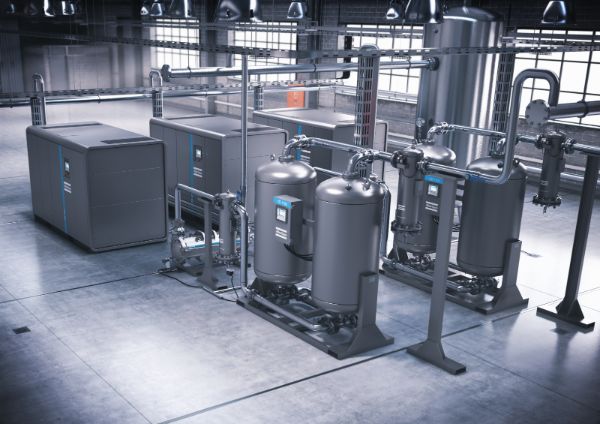
Photo By: aircompressorblog.com
Common Applications
Industrial air compressors are incredibly versatile and can be used in a wide range of applications. Here are some of the most common uses:
- Automotive Repair Shops: Powering pneumatic tools, painting, and tire inflation.
- Manufacturing Plants: Operating machinery, packaging, and automation processes.
- Construction Sites: Providing power for jackhammers, drills, and other tools.
- Food and Beverage Industry: Processing, packaging, and bottling.
- Healthcare: Operating dental tools and other medical equipment.
- Aerospace: Powering tools and equipment used in aircraft maintenance and manufacturing.
Finding the Right Compressor for Your Needs
Choosing the right industrial air compressor depends on your specific needs and applications. Consider factors such as the required pressure, volume, and duty cycle to ensure you select the most suitable compressor.
How to Maintain Your Industrial Air Compressor
Maintaining your industrial air compressor is crucial for ensuring its longevity and optimal performance. Here are some simple maintenance tips:
1. Regularly Change the Filters
Changing the filters regularly is essential to keep your compressor running smoothly. Clogged filters can reduce efficiency and cause the compressor to overheat.
2. Check and Change the Oil
If your compressor uses oil, make sure to check the oil levels regularly and change it as needed. Proper lubrication is vital for preventing wear and tear on the moving parts.
3. Inspect the Hoses and Connections
Regularly inspect the hoses and connections for any signs of wear or damage. Replacing worn-out hoses can prevent leaks and maintain optimal pressure levels.
4. Perform Routine Inspections
Performing routine inspections can help identify potential issues before they become major problems. Check for any unusual noises, vibrations, or changes in performance.
5. Follow the Manufacturer’s Guidelines
Always follow the manufacturer’s maintenance guidelines for your specific compressor model. This ensures that you’re taking the right steps to keep your compressor in top condition.
Conclusion
Industrial air compressors are incredibly versatile and valuable tools that can enhance efficiency, reduce costs, and improve safety in various settings. By understanding the different types of compressors and their applications, you can choose the right one for your needs. Additionally, proper maintenance is key to ensuring your compressor remains reliable and efficient over time.
FAQs About Industrial Air Compressors
Q1: What is an industrial air compressor used for?
An industrial air compressor is used for a wide range of applications, from powering tools and machinery in factories to providing air for painting and tire inflation in auto repair shops. They’re versatile machines that can handle everything from small tasks to large-scale operations.
Q2: Are industrial air compressors noisy?
Not necessarily! While older models might be loud, many modern industrial air compressors are designed to operate quietly. If noise is a concern, look for models specifically labeled as low-noise or with noise-reducing features.
Q3: How often should I maintain my industrial air compressor?
Regular maintenance is key. Check and change filters regularly, inspect hoses and connections, and follow the manufacturer’s guidelines for oil changes and other upkeep. Routine inspections can help catch issues early and keep your compressor running smoothly.
Q4: Can I use an industrial air compressor at home?
Absolutely! While they’re often associated with large factories, industrial air compressors can be used at home for tasks like powering tools, painting, and even inflating tires. Just make sure to choose a model that fits your specific needs.
Q5: What types of industrial air compressors are there?
There are several types, including reciprocating (piston) compressors, rotary screw compressors, centrifugal compressors, and portable compressors. Each type has its own advantages and is suited for different applications.
Q6: How do I choose the right industrial air compressor?
Consider what you’ll be using it for. Think about the required pressure, volume, and duty cycle. Different types of compressors are better suited for different tasks, so match the compressor to your specific needs.
Q7: Are industrial air compressors expensive?
The cost can vary widely depending on the type, size, and features. While the initial investment might be higher, industrial air compressors are built to last and can save you money in the long run by reducing downtime and maintenance costs.
Q8: What are the benefits of using an industrial air compressor?
There are many benefits! They enhance efficiency, reduce costs, provide versatility, improve safety, simplify maintenance, ensure reliability, and offer environmental benefits. They’re a powerhouse addition to any industrial setting.
Q9: Can I rent an industrial air compressor?
Yes, many suppliers offer rental options. Renting can be a good choice if you need a compressor for a short-term project or want to try out a specific model before committing to a purchase.
Q10: What safety precautions should I take when using an industrial air compressor?
Always follow the manufacturer’s safety guidelines. Make sure the compressor is properly maintained, use the right accessories, and ensure the work area is well-ventilated. Safety first!
Q11: How do industrial air compressors help the environment?
Modern industrial air compressors are designed with energy efficiency in mind, which helps reduce your carbon footprint. They also help decrease overall energy consumption by powering tools and machinery more efficiently.
Q12: Can I use an industrial air compressor in different industries?
Definitely! Industrial air compressors are used in various industries, including automotive, manufacturing, construction, food and beverage, healthcare, and aerospace. Their versatility makes them a valuable tool across many sectors.

